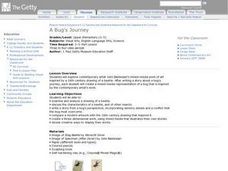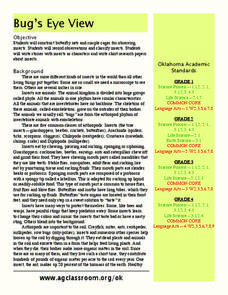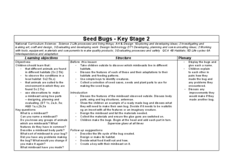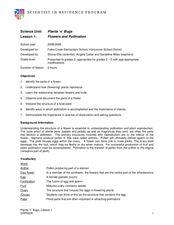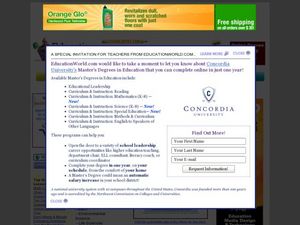Curated OER
Bugs
Learners explore the wonders of bugs. In this bug lesson, students examine various types of bugs. Learners make crafts, sing songs, discuss nutrition, and investigate different types of insects.
Curated OER
Bug Me While I'm Eating!
Students explore nutritional value of insects as food, and compare the nutritional value of insects with that of their favorite foods by completing a table.
Curated OER
Bug's Eye View
Investigate the life of bugs and how they interact with the environment in this integrated science and language arts lesson. Young scientists construct mini environments in cages in order to make observations. This data forms the basis...
Curated OER
Beautiful Bugs
Students investigate the life cycle of ants, ladybugs, and butterflies. They list the four stages of the butterfly life cycle, define symmetry and observe how ants make homes in dirt.
Curated OER
A Bug's Journey
Learners examine the artwork of John Baldessari that was inspired by a 16th century drawing of a beetle. They analyze a drawing of a beetle, discuss the insect's characteristics, and write a story from the perspective of a bug. Also,...
Curated OER
Bugs, Worms and Others
Students explore biology by conducting an outdoor research activity. In this insect identification lesson, students collaborate with classmates to examine organisms they find on a class field trip either in their school playground or a...
Curated OER
Be A Bug Scout
Students perform outside activities to determine the amount of insects, flowers, or common weeds within an area. They predict the number of insects they will find within their square area. Using calculators, students organize the data...
Curated OER
Bug's Eye View
Learners explore biology by writing fictitious stories in class. In this insect life activity, students identify many different types of insects in the animal kingdom and the classifications they fall into. Learners collect insects on a...
Curated OER
Comparing and Collecting Bugs
Students differentiate between insects and non-insects. In this insects instructional activity, students review the attributes of insects and take a nature walk to look for insect homes. Students use resource books to identify the names...
Curated OER
Be on the Lookout!
Young scholars create "Wanted" posters for destructive bugs. They practice research skills as they learn about the characteristics, diets, habitats, and habits of a variety of bugs.
Curated OER
Seed Bugs; Stage 2
Students examine nature by participating in an environmental art activity. In this imaginary creature lesson, students discuss the importance of a habitat when pertaining to wild animals or bugs. Students utilize tree parts which they...
Curated OER
Ugly? Says Who?
Students explore biology by writing animal poetry in class. In this animal characteristics lesson, students research the Internet for facts about an "ugly" animal such as a bug or small critter. Students complete worksheets about animal...
Curated OER
Intriguing Insects
Students record their observations when they examine bugs and beetles. Using the internet, they research the function of each of the parts of certain insects and identify the location of their organs. To end the lesson, they draw a...
Curated OER
Flowers and Pollination
Learners explore the environment by researching plant reproduction. In this pollination lesson, students define botany related vocabulary terms such as disc flower, petal and fertilization. Learners dissect a flower with their classmates...
Curated OER
Milkweed and Monarch Butterfly Mania
Students explore Earth science by completing a worksheet in class. In this botany lesson, students identify the relationship between the Milkweed plant and the butterflies which regularly feed on its nutrients. Students visit a list of...
Curated OER
Rising Temperatures Threaten Penguins
Students examine the continent of Antarctica, then read a news article about the decline in the Antarctic penguin population. In this current events lesson, the teacher introduces the article with a discussion and vocabulary activity,...
Curated OER
Ecuadorian Rainforest: If the Forests Could Talk
Third graders explore the delicate balance the must be maintained in a rainforest ecosystem. In this ecosystems lesson, 3rd graders learn about the importance of "little things" such as bugs or a certain plant in the rainforest. This...
Curated OER
Shelter/Refuge
Young scholars research shelters and places of refuge for animals and humans. In this shelters lesson, students read paragraphs about animal and human shelters. Young scholars complete an activity about beavers and shelters. Students...
Curated OER
How Manduca See
Third graders investigate how manduca sees and they discuss what they think the manduca might be thinking. They write a story about what an insect sees and does from the insect's perspective.
Curated OER
Complete Metamorphosis
Learners use a map and colored pins to plot the migration path of Monarch butterflies. They use data found at the Journey North website. Commas are also used in the activity to show how they are put in a series of words using butterfly...
Curated OER
The Pests of Summer
Students research insects that act as pests during the summer months. They investigate how to protect themselves and their homes from these pests. They study the life cycle of the cicada.






